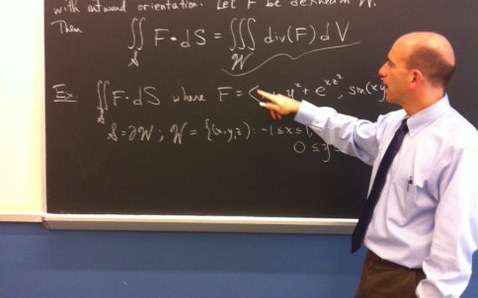
Alexa D’Ambrosio ’17 Sonam Saxena ’17: With collaboration among the math department and the Middle and Upper school faculty, students are given the opportunity to take part in “accelerated” math courses, above their grade levels. After speaking with Dr. Goebeler, member of the math department, Scholium learned about the advanced math placement system and the hopes of the faculty involved.
“I would love to see EA known as the best math program ever,” Goebeler noted. “When people think of a flexible, challenging math program, they should think of EA.”
The faculty has also made it a key objective to give students an education in which they feel “appropriately challenged…not bored, but not drowning,” explained Goebeler. In an attempt to do so, Episcopal has allowed several students to take math beyond that of the rest of their grade.
So, how is a student placed into one of these advanced math classes? According to Goebeler, there are numerous ways.
In some cases, tests and software are used to test a student’s mathematical ability. A student can also be placed in an accelerated math program due to a teacher recommendation should that student receive remarkable grades and demonstrate an extraordinary grasp of the concepts.
In other cases, especially when students are new to EA, their math level can be determined through a discussion-based conference.
In such conversations, which usually take place in the summer, a student is shown mathematical concepts and must demonstrate familiarity and full understanding of the material. A student’s transition into a higher math class should be based on a personal desire or need for challenge and not just “pushed by parents or driven by the desire for a more impressive transcript,” according to Dr. Goebeler. An accelerated math course, however, can take quite a toll on a student. Depending on his or her background, interests, and maturity level, a student has the potential to take full advantage of the opportunity being presented and excel.
A student, although arithmetically gifted, however does not necessarily have the responsibility necessary to manage upper and middle school courses simultaneously.
“The administration has been tremendously supportive,” Dr. Goebeler explained. Despite the possible intimidation or complexity of incorporating upper school math courses into a Middle School student’s schedule, it can and has been accomplished.
The success of the program often depends on the knowledge, willingness, and interest of the student. Nico Christianson ’17 said his “enjoyment of mathematics influences how the accelerated courses keep his interest flourishing.” Christianson is currently taking Multi- Variable Calculus as a ninth grader, joined only by Jeffrey Hu ’14 and Suzie Chen ’15.
Christianson realized his talent in fourth grade, when he first began feeling not challenged by the grade level courses. Christianson, apprehensive about joining his sister’s eleventh grade level Pre-calculus class as a seventh grader, found that the rest of the class welcomed him and was ready to learn alongside him. For students like Christianson, EA’s accelerated math program was extremely beneficial. Not only did he gain from a more challenged mathematical perspective in the classroom, but he also felt it assisted his analytical abilities in real life situations.